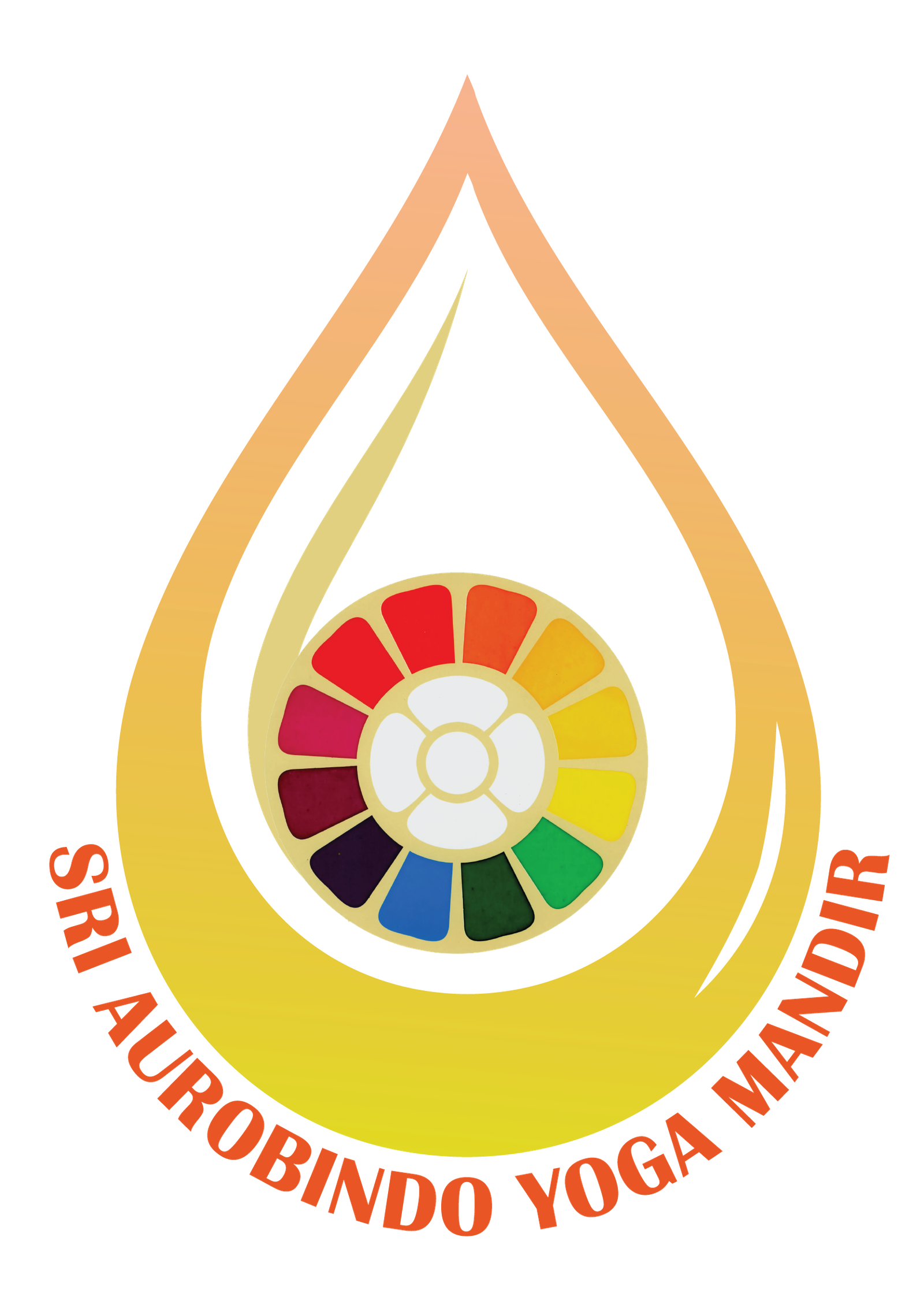Detect first what is false or obscure in you and persistently reject it, then alone can you rightly call for the divine Power to transform you.
Sri Aurobindo
01. School (Sri Matri Aurobindo Vidyalaya)



The Sri Matri Aurobindo Vidyalaya school – at the heart of Sri Aurobindo Yoga Mandir – cultivates a creative, inclusive environment where students excel academically, while flourishing intellectually, emotionally, and spiritually: a testament to the transformative power of holistic learning.
Our education ethos lies in peer-to-student guidance and teaching where the children learn from their elders, fostering empathy, leadership, and community. Directed by Veda and our teaching staff, many of whom have deep roots in the Ashram, our students – alongside their academic work – are imbued with the spiritual principles and values of Sri Aurobindo and the Mother. From 12 students in a mud hut, we have grown into a thriving institution with 120 students in a three-story building, teaching and training them to grow into lifelong learners, critical thinkers, and – above all – men and women of compassion.
02. Dairy Farm
Guruji’s early life in the mountains and pastures at Gulmi was spent among cows – even sleeping under them when it rained – the love for which he brought with him to the ashram in Kathmandu. At the base of the forest that stretches up and over the Chandragiri hills, the ashram provides a sanctuary for over 40 cows, each one treated with the utmost care and affection.
Our cows yield around 300 litres of milk a day, from which we create a diversity of products: anything from milk to ghee, cream, butter, yogurt, paneer, and buttermilk. More than merely wholesome, healthy dairy products for the ashramis, they also embody the principles of rural simplicity and purity that we hold dear.
A key part of our ashram family community is the art of cow-care. So, the cowshed – which is wholly maintained by the students – is a living classroom, where hands-on experience with our cows instils a sense of responsibility, compassion, and a significant connection with nature.
Sustainability is a new catchword in the West, but the Himalayan farmers – from whose ranks Guruji came – always farmed sustainably, within the cycles of nature. The grass that feeds our cows is cultivated at the ashram, and the compost produced is used as natural fertilizer for the farm.

We sell surplus milk and other products in Kathmandu, helping to make us self sufficient. Every rupee ever generated goes towards maintaining the ashram and the school for the children, and for their education often beyond the ashram.
03. Incense Department

The incense department – producing handmade, herbal incense – is our oldest department, and a cornerstone of our community. Guruji made incense at the Sri Aurobindo ashram in Pondicherry, a skill he brought back with him to Nepal. Made from aromatic plant-based materials – resins, barks, seeds, roots, and flowers – the incense is wholly natural. Often, walking round the ashram, you will come across a soothing spiritual waft of incense, reminding you of the ashram’s svarupa, or essential spiritual form.
Our collection of incense aromas and fragrances includes:
- Sandalwood, known for its calming and grounding effects.
- Jatamansi, which promotes relaxation and mental clarity.
- Pine, offering a refreshing and revitalizing scent.
- Austha Suganda, famous for its rich and earthy aroma.
- Himalayan Cedar, a deep, woody fragrance that enhances spiritual mood and quality.
- And Citronella, with a fresh, citrusy scent that also acts as a natural insect repellent.
These varieties ensure that there is an incense type for every preference and purpose, enhancing both spiritual and everyday experiences.

04. Natural Health Care Product

Using natural, healthy, organic ingredients, we make bars of shampoo and soap at the ashram at Kathmandu. Each bar is enriched with essential oils and natural extracts. And with sustainability in mind, our packaging is minimal and biodegradable.
3 Types of Shampoo Bars:
- Nettle and Clay: Soothes the scalp and adds volume to your hair.
- Neem and Lemongrass: Notable for its antibacterial properties, it helps keep your scalp healthy and refreshed.
- Mint and Charcoal: For deep cleansing and removing impurities.
Body Soap:
Experience the luxury of our handcrafted body soaps, designed to cleanse and moisturize your skin naturally.
3 Types of Body Soap Bars:
- Palmarosa: Intense hydration with a delicate, floral scent.
- Sweet Basil: With a refreshing tang of basil that soothes and revitalizes the skin.
- Spirulina: Packed with nutrients, this butter nourishes and rejuvenates your skin.
Creams :
Stay fresh naturally with our effective and eco-friendly deodorant cream, designed to keep you feeling confident all day long.
- Face
- Body
- Deodorant
05. Pashmina Department

At the ashram – alongside teaching and farming as a way of life – we’re dedicated to the craft of handmade textile products, which can involve a multiplicity of processes: sourcing, blending, spinning, weaving, dyeing and finishing. Each step is done by hand.
Aiming for the highest quality, while preserving and using traditional techniques, each product is carefully fashioned by our skilled artisans.
These are:
- 100% Pashmina shawls: made from the fine cashmere wool of Himalayan goats, these shawls are famous for their inimitable softness, warmth, and lightness.
- 70% Pashmina with 30% silk shawls: preserve the softness of pure pashmina with the sheen and durability of silk.
- Yak shawls: a unique blend of warmth and durability.
- Cotton towels: valued for their softness, absorbency, and durability.


Handmade textile production at Sri Aurobindo
Yoga Mandir is a vital part of the community’s economic and social configuration.
The revenue generated by these products supports a variety of educational and
social projects. There is no ‘profit’, per se, everything goes back into the
ashram and the school. The textile activities also provide employment, preserve
traditional skills, and promote a sustainable, holistic lifestyle.
06. The Bakery Department
BAKERY
Aligned with our commitment to purity and health, the Bakery at Sri Aurobindo Yoga Mandir produces wholesome, nutritive baked goods. And given our devotion to nature and vegetarian principles, they are 100% eggless.
We offer a diverse range of baked products, including:
- Multi-Grain Bread: made from multiple grains, this is a hearty, wholesome choice.
- Whole Wheat Bread: 100% wholewheat, for those who prefer a more natural diet.
- Millet Bread: gluten-free and rich in fibre and essential nutrients.
- Diabetes Bread: specially made with a low glycaemic index, for people with diabetes.
- Cakes and Muffins: a selection of tasty eggless cakes and muffins.
The Bakery is crucial in the daily life of the ashram. We regularly bake bread and chapatis for the children, particularly for dinner. Bakery snacks too are popular.

07. Nursery (Plants and Trees)
Cultivating Nature, Nurturing Minds
The nursery is a verdant, leafy space dedicated to the cultivation of flowers, herbs, and trees, which lends itself perfectly to the flourishing, eco environment at the ashram. And given our focus on nature and sustainability in the students’ education, the nursery is pivotal in the spiritual and practical life of the community.
Teaching and Learning
- We grow a range of different flowers, which beautify the ashram, but also we use in our daily offerings, ceremonies, and sacred rituals.
- We cultivate various medicinal and culinary herbs, used in both the ashram kitchen and the ayurvedic clinic.
- We have planted and nurture many trees at the ashram, for shade, fruit, and ecological balance. But, above all, for their beauty.


Vegetable Garden
The students apply the knowledge and skills they learned in the nursery, in the vegetable garden. There they grow a variety of vegetables for the kitchen, ensuring a steady supply of fresh, organic produce for the community of students, devotees, bramacharyas, volunteers and guests at the ashram.
08. Natural Healing
Panchakarma: Rejuvenating the Body, Mind, and Spirit
At Sri Aurobindo Yoga Mandir, we offer a holistic Panchakarma experience, an ancient Ayurvedic therapy that detoxifies, rejuvenates, and revitalizes the body, mind, and spirit. Originating in the wisdom of Ayurveda, Panchakarma translates to “five actions” or “five treatments” and is designed to cleanse the body of accumulated toxins and restore its natural balance.
What is Panchakarma?
Panchakarma is a comprehensive purification process that involves five key therapeutic practices. These therapies work together to eliminate deep-seated toxins, improve digestion, and strengthen immunity, leading to enhanced overall health and vitality. The five main components of Panchakarma include:
-
Vamana(Therapeutic Emesis)–
A gentle procedure aimed at detoxifying the upper gastrointestinal tract, particularly the lungs and stomach. It helps in removing Kapha-related toxins and is often recommended for conditions like asthma, bronchitis, and chronic congestion. -
Virechana (Purgation Therapy)–
A method of cleansing the liver and intestines. Virechana helps flush out toxins that accumulate in the liver and gallbladder, improving digestion and promoting better skin health. This therapy is particularly beneficial for conditions related to Pitta imbalance. -
Basti (Enema Therapy) –
A specialized treatment that purifies the colon. Medicated oils or herbal concoctions are introduced to eliminate toxins related to Vata imbalances, helping with issues like constipation, joint pain, and other neurological conditions. -
Nasya (Nasal Administration) –
A cleansing therapy for the nasal passages, sinuses, and head. Herbal oils are administered through the nose to clear and purify the upper respiratory tract. Nasya is effective for treating sinus congestion, migraines, and mental fog. -
Raktamokshana (Blood Letting) –
A procedure that purifies the blood, enhancing circulation and reducing toxin build-up. Though used selectively, Raktamokshana is beneficial for treating skin disorders, chronic infections, and some cases of hypertension.

Benefits of Panchakarma
Panchakarma is not only a detoxifying process but also a path to rejuvenation. By releasing stored toxins and emotional blockages, it helps restore harmony to the body, mind, and spirit. Some key benefits include:
- Improved digestion and metabolism
- Enhanced immunity and overall vitality
- Relief from stress, anxiety, and fatigue
- Increased mental clarity and emotional balance
- Better management of chronic illnesses
- Improved skin health and radiance

Our Panchakarma Process
At Sri Aurobindo Yoga Mandir, Panchakarma treatments are tailored to each individual, taking into account your unique constitution (Prakriti) and current state of health. Our experienced Ayurvedic practitioners conduct a thorough consultation and customize the therapy to support your specific health goals. Each session is complemented with herbal remedies, dietary guidance, meditation, and gentle yoga to maximize the effects of the detoxification process.

